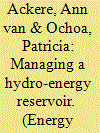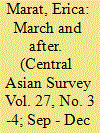| Srl | Item |
| 1 |
ID:
099358


|
|
|
|
|
| Publication |
2010.
|
| Summary/Abstract |
Liberalisation and privatisation have increased the need to gain more understanding into the management of hydro storage (HS) plants. We analyse what types of reservoir management policies enable an owner or a public authority to achieve their respective objectives. By "policy" we understand simple, easily applicable decision rules, which enable a decision maker to decide when and how much to produce based on currently available information. We use a stylised deterministic simulation model of a hydro-power producer (HP) who behaves strategically. We study a non-liberalised market, where the authorities aim to minimise the total electricity cost for customers and a liberalised market where the HP attempts to maximise his contribution. This enables us to evaluate the impact of the liberalisation of HS production decisions on production volumes and electricity prices. We conclude that imposing rigid policies with the aim of limiting the potential for strategic behaviour can create incentives to produce only at very high prices throughout the year. This can lead to very high total costs, especially when the producer has most flexibility (large reservoirs combined with large turbine capacity). More surprisingly, we observe lower total production in a non-liberalised market.
|
|
|
|
|
|
|
|
|
|
|
|
|
|
|
|
| 2 |
ID:
085527


|
|
|
|
|
| Publication |
2008.
|
| Summary/Abstract |
This article recalls the major events that have taken place since 24 March 2005. It examines Bakiev's new government formed in December 2007, analyses the changes in criminal world dynamics, explains problems in the hydro-energy sector, and concludes with a section on civil society groups. The article demonstrates how corruption, crime and politics are interlinked in the country and how, on the other hand, local civil society groups have proved to be considerably more stable compared to political parties.
|
|
|
|
|
|
|
|
|
|
|
|
|
|
|
|